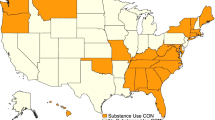Abstract
In 1998, Michigan Medicaid “carved out” substance abuse treatment from its medical plans, transferring the management responsibility and substantial financial risk to 15 specialized local entities called coordinating agencies. All these agencies were either nonprofit or publicly owned, unlike carve-out entities in many other states. By the second year of the risk-based carve-out (2000), Medicaid payments per eligible were 9.1% lower than in the last year before the carve-out (1998). Reductions were largely achieved by serving fewer clients, not by reducing payments per client. Agencies faced with revenue reductions or small increases were more likely to reduce treatment spending.
Similar content being viewed by others
REFERENCES
Bloom, J. R., Hu, T., Wallace, N., Cuffel, B., Hausman, J., & Scheffler, R. (1998). Mental health costs and outcomes under alternative capitation systems in Colorado: Early results. Journal of Mental Health Policy and Economics, 1(1), 3-13.
Bloom, J. R., Hu, T., Wallace, N., Cuffel, B., Hausman, J. W., Sheu, M. L., & Scheffler, R. (2002). Mental health costs and access under alternative capitation systems in Colorado. Health Services Research, 37(2), 315-340.
Burns, B. J., Teagle, S. E., Schwartz, M., Angold, A., & Holtzman, A. (1999). Managed behavioral health care: A Medicaid carve-out for youth. Health Affairs, 18(5), 214-225.
Callahan, J. J., Shepard, D. S., Beinecke, R. H., Larson, M. J., & Cavanaugh, D.(1995). Mental health/substance abuse treatment in managed care: The Massachusetts Medicaid experience. Health Affairs, 14(3), 173-184.
Chang, C. F., Kiser, L. J., Bailey, J. E., Martins, M., Gibson, W. C., Schaberg, KA., Mirvis, D. M., & Applegate, W. B. (1998). Tennessee's failed managed care program for mental health and substance abuse services. Journal of the American Medical Association, 279(11), 864-869.
Cutler, D. L., McFarland, B. H., & Winthrop, K. (1998). Mental health in the Oregon Health Plan: Fragmentation or integration? Administration and Policy in Mental Health, 25(4), 361-386.
Deck, D. D., McFarland, B. H., Titus, J. M., Laws, K. E., & Gabriel, R. M. (2000). Access to substance abuse treatment services under the Oregon Health Plan. Journal of the American Medical Association, 284(16), 2093-2099.
Donohue, J. M., & Frank, R. G. (2000). Medicaid behavioral health carve-outs: A new generation of privatization decisions. Harvard Review of Psychiatry, 8(5), 231-241.
Ettner, S. L., Frank, R. G., McGuire, T. G., & Hermann, R. C. (2001). Risk adjustment alternatives in paying for behavioral health care under Medicaid. Health Services Research, 36(4), 793-811.
Frank, R. G., McGuire, T. G., & Newhouse, J. P. (1995). Risk contracts in managed mental health care. Health Affairs, 14(3), 50-64.
Grazier, K. L., & Eselius, L. (1999). Mental health carve-outs: Effects and implications. Medical Care Research and Review, 56(2), 37-59.
Hadley, J., Zuckerman, S., & Feder, J. (1989). Profits and fiscal pressure in the Prospective Payment System: Their impacts on hospitals. Inquiry, 26(3), 354-365.
Hanson, K. W., & Huskamp, H. A. (2001). State health care reform: Behavioral health services under Medicaid managed care: The uncertain implications of state variation. Psychiatric Services, 52(4), 447-450.
Hodgkin, D., Horgan, C. M., Garnick, D. W., Merrick, E. L., & Goldin, D. (2000). Why carve out? Determinants of behavioral health contracting choice among large U.S. employers. Journal of Behavioral Health Services and Research, 27(2), 178-193.
Hodgkin, D., Shepard, D. S., & Beinecke, R. H. (2002). Management of outpatient substance abuse treatment by medical plans: Michigan providers' experience. Alcoholism Treatment Quarterly, 20(1), 79-96.
Kapur, K., & Weisbrod, B. A. (2000). The roles of government and nonprofit suppliers in mixed industries. Public Finance Review, 28(4) 275-308.
Michigan Department of Community Health(2000, September). Revised plan for procurement of Medicaid specialty prepaid health plans: Final version.
Shepard, D. S., Daley, M., Ritter, G. A., Hodgkin, D., & Beinecke, R. H. (2001). Effects of a statewide carve-out on spending and access to substance abuse treatment in Massachusetts, 1992 to 1996. Health Services Research, 36(6), Part II: 32-44.
Steenrod, S., Brisson, A. S., McCarty, D., & Hodgkin, D. (2001). Effects of managed care on programs and practices for the treatment of alcohol and drug dependence. In M. Galanter (Ed.), Recent developments in alcoholism, Vol. 15(pp. 51-71). New York: Plenum Press.
Stelovich, S. (1998). Managed care and the public patient. Behavioral Healthcare Tomorrow. 7(2), 33-35.
Stoner, T., Manning, W., Christianson, J., Gray, D. Z., & Marriott, S. (1997, Spring). Expenditures for mental health services in the Utah Prepaid Mental Health Plan. Health Care Financing Review, 18(3), 73-93.
Stroul, B. A., Pires, S. A., & Armstrong, M. I. (2001). Health care reform tracking project: Tracking state health care reforms as they affect children and adolescents with behavioral health disorders and their families—2000 state survey. Tampa, FL: University of South Florida.
Sturm, R. (1999). Tracking changes in behavioral health services: How have carve-outs changed care? Journal of Behavioral Health Services and Research, 26(4), 360-371.
Weissert, C. S., & Goggin, M. L. (2002). Non-incremental policy change: Lessons from Michigan's Medicaid managed care initiatives. Public Administration Review, 62(2), 206-216.
Author information
Authors and Affiliations
Corresponding author
Rights and permissions
About this article
Cite this article
Hodgkin, D., Shepard, D.S., Anthony, Y.E. et al. A Publicly Managed Medicaid Substance Abuse Carve-Out: Effects on Spending and Utilization. Adm Policy Ment Health 31, 197–217 (2004). https://doi.org/10.1023/B:APIH.0000018830.30885.11
Issue Date:
DOI: https://doi.org/10.1023/B:APIH.0000018830.30885.11




